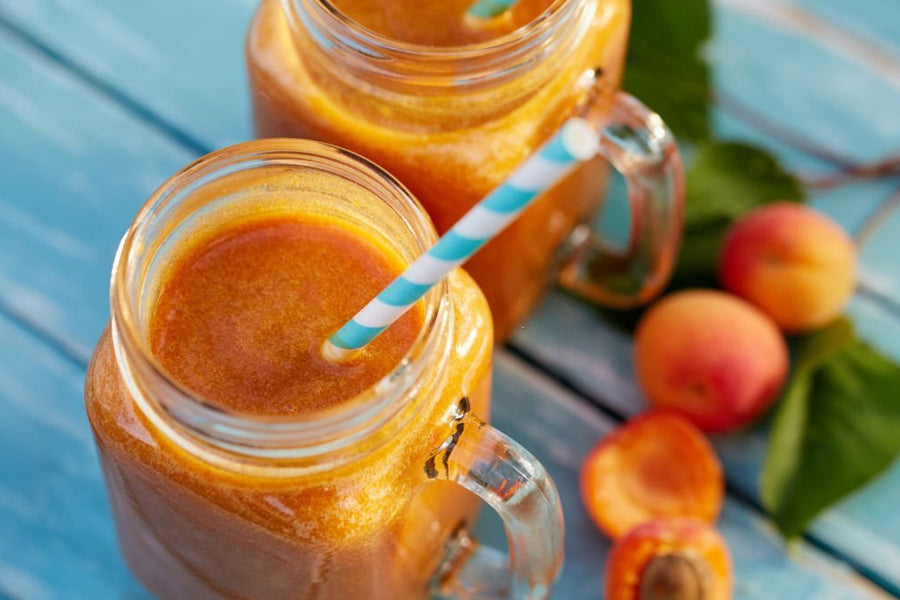There's nothing like the taste of ripe peach, is there? Peaches are a summertime favourite for many people, and they can be enjoyed in all sorts of ways. One delicious way to enjoy peaches is in a smoothie bowl!
If you are concerned about whether fruit smoothies are good for weight loss or not, it’s time that you learn that fruit smoothie bowls can definitely help promote weight loss. The ingredients in a typical fruit smoothie bowl are all very healthy and low in calories to help you feel full and content without consuming too many calories.
Additionally, the act of blending fruits and vegetables together helps break down their cell walls, making their nutrients more bioavailable. This means that your body will absorb better beneficial compounds found in fruits and vegetables, leading to better health overall.
So if you're looking for a nutritious plus delicious weight-loss-friendly breakfast or snack option, fruit smoothie bowls are a great choice!
This smoothie bowl has just 10g of sugar, so you might not need to watch your sugar intake for the rest of the day. This smoothie bowl is healthy due to the nutritional benefits of the kale and the peaches. This hearty bowl contains 18 grams of protein and 7 grams of fibre. You'll feel full after you have it on your breakfast or as a snack.
Nutritional Value
|
Calories |
301 |
|
Fat |
14 g |
|
Sugar |
10 g |
|
Protein |
18 g |
|
Carbohydrates |
47 g |
Ingredients
- 1 Cup Peach Slices, Frozen
- 3/4 Cup Chopped Kale, Stems Removed and Split
- 1/2 Cup Vanilla Almond Milk, Unsweetened
- 1/4 cup low-fat plain yogurt
- 1/4 Cup Low-fat Plain Yogurt
- 1 Teaspoon Honey
- 1 Tsp Fresh Ginger, Grated
- 4-5 Thawed Fresh or Frozen Peach Slices
- 2 Tbsp. Toasted Sliced Almonds
How to Make It?
- Combine frozen peach slices, 1/2 cup kale, almond milk, yogurt, lemon juice, honey, and ginger in a blender. Blend until smooth.
- Fill a bowl halfway with the smoothie, add fresh peach slices, the remaining 1/4 cup kale, and the almonds go on top. Here you go!
Health Benefits of Kale

While it has been a key player in the health and wellness scene for many years, Kale is still a superfood that can provide a lot of nutritional power.
World's Most Nutritious Food
One cup of raw kale that makes approximately 67g or 2.4 ounces contains :
- Vitamin A- 206% Daily Value (DV) from beta carotene
- Vitamin K: 6844% of the DV
- Vitamin A: 134% DV
- Manganese 26% DV
- Copper: 10% off the DV
It also contains 3% to more than the DV for vitamin A1 (thiamin), Vitamin B2 (riboflavin), Vitamin B3 (niacin), Iron, and phosphorus.
You can take your health to the next level by adding DMoose multivitamins to your diet. These supplements contain vitamins, minerals, nutrients, and herbal extracts that target specific body systems to improve mitochondrial health, cardiovascular endurance, and bone and joint health.
Related Article: Vitamins and Minerals That You Should Take Daily
Kale is High in Antioxidants
Kale is high in antioxidants such as quercetin and kaempferol amongst them are beta-carotene and vitamin C, as well as flavonoids and polyphenols.
Antioxidants are chemicals that assist your body in fighting oxidative damage caused due to free radicals. Oxidative damage is known to be one of the main causes of aging and various illnesses, including cancer.
On the other hand, antioxidants have a variety of other critical activities. These include flavonoids quercetin and kaempferol, which are present in quite considerable concentrations in kale.
Kale Reduces Cholesterol
Recent studies have shown that Kale can reduce cholesterol levels, making it an ideal food for people trying to lower their cholesterol levels. It is a great addition to any meal and can help improve your health in many ways.
Kale may aid in the reduction of cholesterol, which may lower the risk of heart disease.
Cholesterol serves a variety of roles in the body, such as producing bile acids. These chemicals aid in the digestion of fats.
When you consume a fatty meal, your liver converts cholesterol into bile acids, which are subsequently released into your digestive tract. When all of the fat has been absorbed by the body, and the bile acids have completed their role, they are reabsorbed and utilized again.
Bile acid sequestrants are substances that bind bile acids in the digestive tract, preventing them from being reabsorbed. The overall quantity of cholesterol in the body is reduced as a result of this.
With these nutritional superpowers, Kale is a must to add to your daily diet. So let us get into the recipe and gulp down the most healthy smoothie you would have ever had!
If you're looking to keep your cholesterol in check, omega-3 supplements may be a good option for you. DMoose omega 3 supplements help to reduce bad cholesterol and triglycerides, while also increasing good cholesterol.
Related Article: The Exact Foods Vegans Should Have on a Daily Basis for Getting All Nine Essential Amino
Wrapping Up
There's no doubt that fruit smoothies are a great way to get your daily dose of fruits and vegetables. Peach smoothies are high in fibre and low in calories, making them the perfect drink for losing weight. They're also very filling, so you won't feel hungry after drinking one.
In addition, adding kale to your diet can provide a number of health benefits, including many vitamins and antioxidants. Consuming kale also helps reduce cholesterol. So grab your juicer blender and go for this nutritional, filling and delicious recipe today!
Reading List
Article Sources
- Kahlon, T. S., et al. "In Vitro Binding of Bile Acids by Spinach, Kale, Brussels Sprouts, Broccoli, Mustard Greens, Green Bell Pepper, Cabbage and Collards." Food Chemistry, vol. 100, no. 4, Jan. 2007, pp. 1531–36. ScienceDirect, https://doi.org/10.1016/j.foodchem.2005.12.020.
- Sikora, Elżbieta, and Izabela Bodziarczyk. "Composition and Antioxidant Activity of Kale (Brassica Oleracea L. Var. Acephala) Raw and Cooked." Acta Scientiarum Polonorum. Technologia Alimentaria, vol. 11, no. 3, Sept. 2012, pp. 239–48.
 Skip to content
Skip to content











